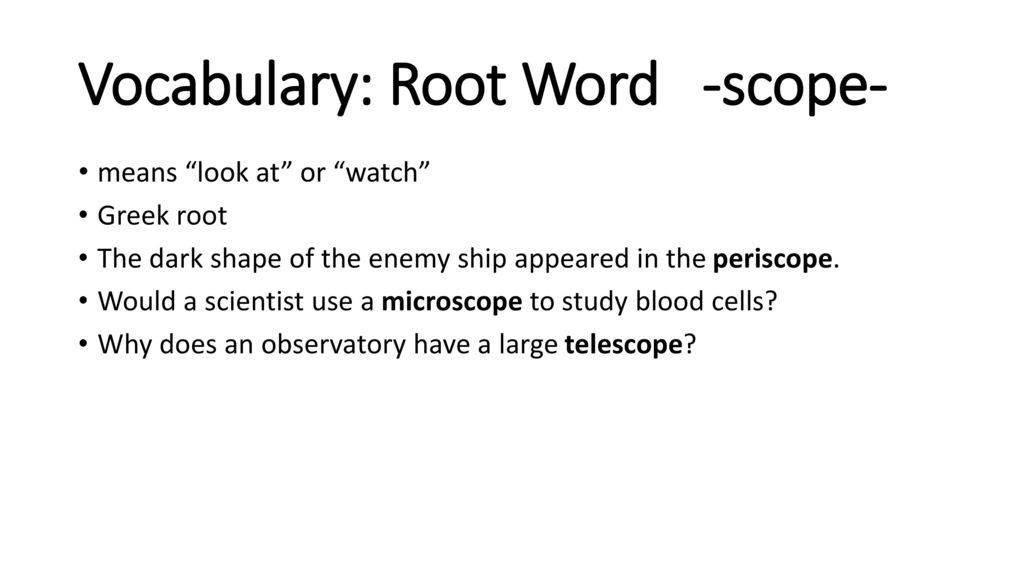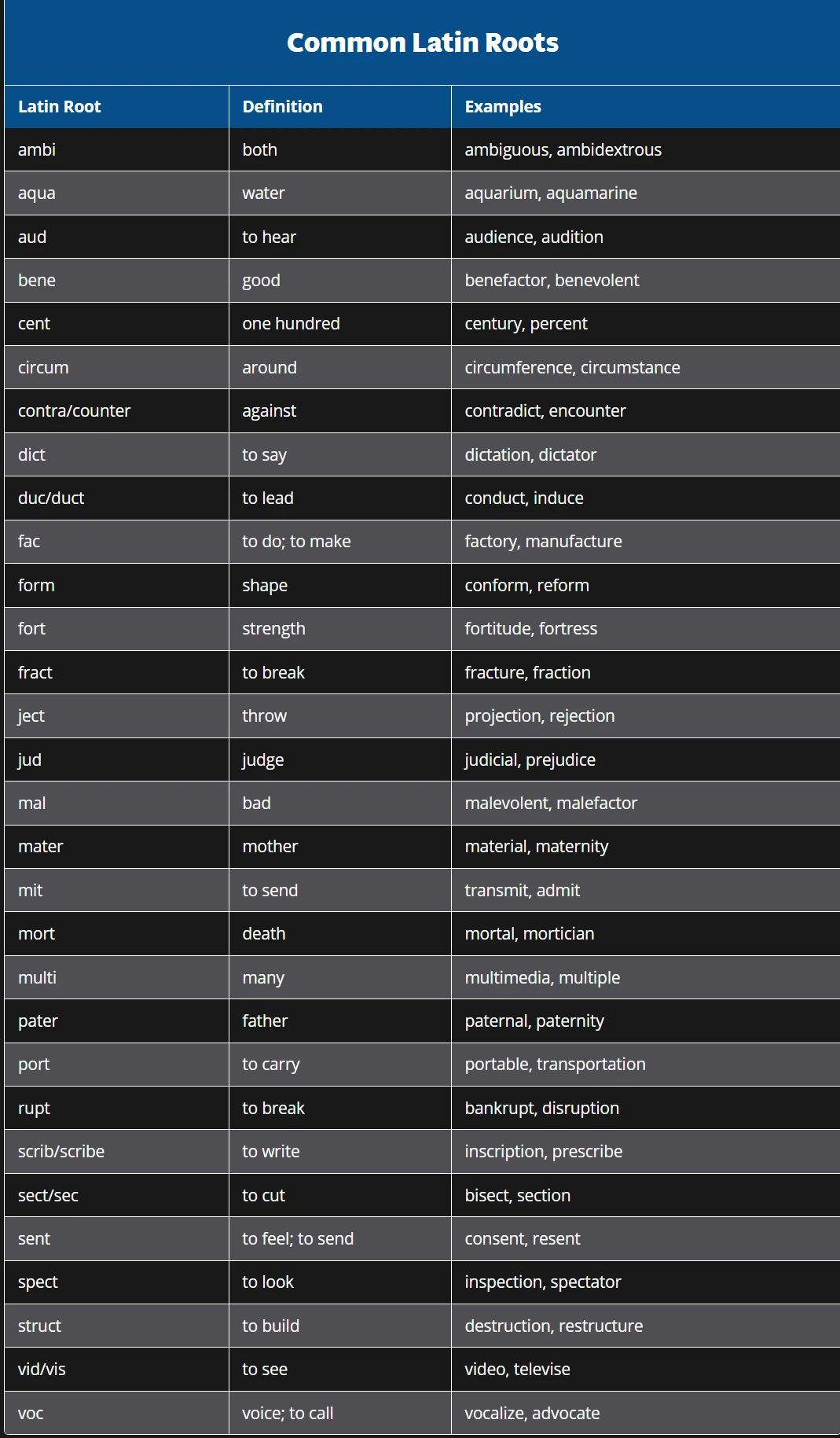Greek Root Word Scope - The number of instruments which scope one thing or another. Used to make terms denoting an instrument used for viewing or examination. 1640s, from italian telescopio (galileo, 1611), and modern latin telescopium (kepler, 1613), both from greek teleskopos far. The word scope comes from the middle english term scōp, which itself originates from the old english scēawung, meaning a view, prospect,. From ancient greek σκοπέω (skopéō, “examine,.
The word scope comes from the middle english term scōp, which itself originates from the old english scēawung, meaning a view, prospect,. The number of instruments which scope one thing or another. Used to make terms denoting an instrument used for viewing or examination. 1640s, from italian telescopio (galileo, 1611), and modern latin telescopium (kepler, 1613), both from greek teleskopos far. From ancient greek σκοπέω (skopéō, “examine,.
Used to make terms denoting an instrument used for viewing or examination. The number of instruments which scope one thing or another. The word scope comes from the middle english term scōp, which itself originates from the old english scēawung, meaning a view, prospect,. From ancient greek σκοπέω (skopéō, “examine,. 1640s, from italian telescopio (galileo, 1611), and modern latin telescopium (kepler, 1613), both from greek teleskopos far.
Struct and Scope Root Words YouTube
The word scope comes from the middle english term scōp, which itself originates from the old english scēawung, meaning a view, prospect,. From ancient greek σκοπέω (skopéō, “examine,. Used to make terms denoting an instrument used for viewing or examination. The number of instruments which scope one thing or another. 1640s, from italian telescopio (galileo, 1611), and modern latin telescopium.
300 Commonly Used Root Words, Prefixes, & Suffixes Free PDF Greek
From ancient greek σκοπέω (skopéō, “examine,. Used to make terms denoting an instrument used for viewing or examination. The word scope comes from the middle english term scōp, which itself originates from the old english scēawung, meaning a view, prospect,. 1640s, from italian telescopio (galileo, 1611), and modern latin telescopium (kepler, 1613), both from greek teleskopos far. The number of.
Greek Root Meaning of Having a Form
Used to make terms denoting an instrument used for viewing or examination. 1640s, from italian telescopio (galileo, 1611), and modern latin telescopium (kepler, 1613), both from greek teleskopos far. The number of instruments which scope one thing or another. From ancient greek σκοπέω (skopéō, “examine,. The word scope comes from the middle english term scōp, which itself originates from the.
Work 8/14/17 Copy the mentor sentence in your notebook and
From ancient greek σκοπέω (skopéō, “examine,. 1640s, from italian telescopio (galileo, 1611), and modern latin telescopium (kepler, 1613), both from greek teleskopos far. Used to make terms denoting an instrument used for viewing or examination. The word scope comes from the middle english term scōp, which itself originates from the old english scēawung, meaning a view, prospect,. The number of.
Fifth Grade Greek and Latin Roots Worksheets
From ancient greek σκοπέω (skopéō, “examine,. The word scope comes from the middle english term scōp, which itself originates from the old english scēawung, meaning a view, prospect,. Used to make terms denoting an instrument used for viewing or examination. 1640s, from italian telescopio (galileo, 1611), and modern latin telescopium (kepler, 1613), both from greek teleskopos far. The number of.
Spelling and Word Study Root Words, Roots and Affixes 哔哩哔哩
Used to make terms denoting an instrument used for viewing or examination. From ancient greek σκοπέω (skopéō, “examine,. 1640s, from italian telescopio (galileo, 1611), and modern latin telescopium (kepler, 1613), both from greek teleskopos far. The word scope comes from the middle english term scōp, which itself originates from the old english scēawung, meaning a view, prospect,. The number of.
what's Greek root word scope/scopos/skopus mean
1640s, from italian telescopio (galileo, 1611), and modern latin telescopium (kepler, 1613), both from greek teleskopos far. From ancient greek σκοπέω (skopéō, “examine,. The number of instruments which scope one thing or another. The word scope comes from the middle english term scōp, which itself originates from the old english scēawung, meaning a view, prospect,. Used to make terms denoting.
300 Commonly Used Root Words, Prefixes, & Suffixes Free PDF Greek
From ancient greek σκοπέω (skopéō, “examine,. The word scope comes from the middle english term scōp, which itself originates from the old english scēawung, meaning a view, prospect,. 1640s, from italian telescopio (galileo, 1611), and modern latin telescopium (kepler, 1613), both from greek teleskopos far. Used to make terms denoting an instrument used for viewing or examination. The number of.
Work 8/14/17 Copy the mentor sentence in your notebook and
Used to make terms denoting an instrument used for viewing or examination. The number of instruments which scope one thing or another. The word scope comes from the middle english term scōp, which itself originates from the old english scēawung, meaning a view, prospect,. 1640s, from italian telescopio (galileo, 1611), and modern latin telescopium (kepler, 1613), both from greek teleskopos.
COMMON GREEK ROOTS Greek roots, Spelling bee, Vocabulary
Used to make terms denoting an instrument used for viewing or examination. 1640s, from italian telescopio (galileo, 1611), and modern latin telescopium (kepler, 1613), both from greek teleskopos far. From ancient greek σκοπέω (skopéō, “examine,. The number of instruments which scope one thing or another. The word scope comes from the middle english term scōp, which itself originates from the.
The Word Scope Comes From The Middle English Term Scōp, Which Itself Originates From The Old English Scēawung, Meaning A View, Prospect,.
From ancient greek σκοπέω (skopéō, “examine,. The number of instruments which scope one thing or another. 1640s, from italian telescopio (galileo, 1611), and modern latin telescopium (kepler, 1613), both from greek teleskopos far. Used to make terms denoting an instrument used for viewing or examination.









